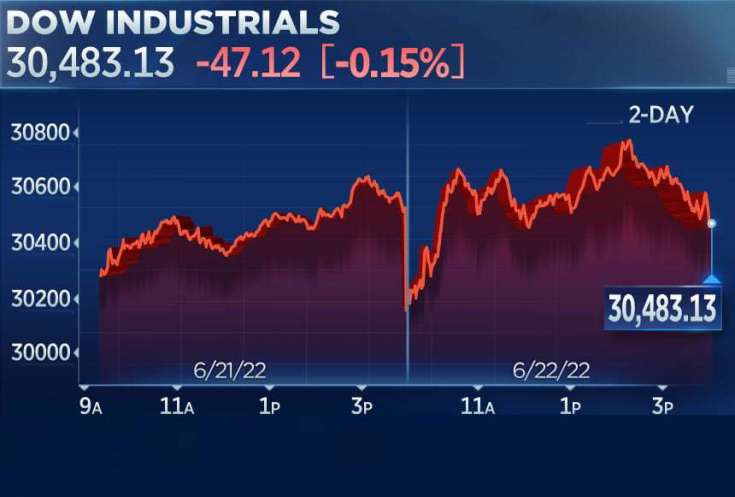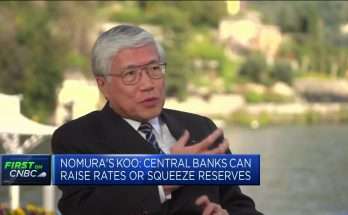
Stocks fell slightly Wednesday in choppy trading as markets struggled to sustain a rebound from earlier in the day.
Traders also weighed comments from Federal Reserve Chair Jerome Powell, who reiterated the central bank’s stance to fight inflation.
The Dow Jones Industrial Average dropped 47.12 points, or 0.15%, to 30,483.13, slipping in the final hour of trading. The S&P 500 dipped 0.13% to 3,759.89. The Nasdaq Composite fell 0.15% to 11,053.08.
Growing concerns of a recession on Wall Street have recently weighed on stocks. Fed Chair Powell on Wednesday told Congress the central bank has the “resolve” to tame inflation that has surged to 40-year highs.
“At the Fed, we understand the hardship high inflation is causing,” the Fed chief said to the Senate Banking Committee. “We are strongly committed to bringing inflation back down, and we are moving expeditiously to do so.”
Powell added that the Fed will stay the course until it sees “compelling evidence that inflation is moving down.” He also said achieving a soft landing for the economy without a recession has become “significantly more challenging.”
The Federal Reserve raised rates by 0.75 percentage point last week and hinted another increase of that magnitude was possible next month. The central bank’s shift last week to a more aggressive inflation-fighting stance unnerved investors who worried the central bank would rather risk a recession than endure persistent high inflation.
“Inflation remains the biggest risk to financial assets, and Jerome Powell has made his position abundantly clear: The Fed will continue to raise interest rates until inflation begins to wane. Until then, a sustainable rally for risk assets is hard to imagine,” wrote Robert Schein, chief investment officer of Blanke Schein Wealth Management.
“Tight monetary conditions will continue to be a headwind to financial markets until the Fed gives the greenlight,” Schein continued.
Recession concerns
Expectations of a pending recession continued to grow on Wall Street this week. Citigroup raised chances of a global recession to 50%, pointing to data that consumers are starting to pull back on spending.
“The experience of history indicates that disinflation often carries meaningful costs for growth, and we see the aggregate probability of recession as now approaching 50%,” read a note from Citigroup.
Goldman Sachs believes a recession is becoming increasingly likely for the U.S. economy, saying that the risks are “higher and more front-loaded.”
“The main reasons are that our baseline growth path is now lower and that we are increasingly concerned that the Fed will feel compelled to respond forcefully to high headline inflation and consumer inflation expectations if energy prices rise further, even if activity slows sharply,” the firm said in a note to clients.
Meanwhile, UBS said Tuesday in a note to clients that it does not expect a U.S. or global recession in 2022 or 2023 in its base case, “but it’s clear that the risks of a hard landing are rising.”
“Even if the economy does slip into a recession, however, it should be a shallow one given the strength of consumer and bank balance sheets,” UBS added.
Energy stocks took a hit as oil prices dropped on concern a slower economy will hurt fuel demand. The sector was the worst performing on the broad-market index, down nearly 4.2%.
Shares of Marathon Oil and ConocoPhillips dropped 7.2% and about 6.3%, respectively. Occidental Petroleum and Exxon Mobil dipped 3.6% and nearly 4%.
On Wednesday, President Joe Biden called for Congress to suspend the federal gas tax for three months. The effort is meant to ease pressures at the pump for consumers during an election year.


